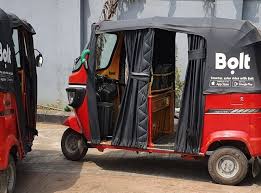Bolt, the biggest ride-hailing company in Nigeria based on market share, has launched its first fleet of electric tricycles in Lagos and is providing drivers with a lease-to-own option to reduce fuel expenses and increase profits.
The action is a component of the company’s larger initiative to promote sustainable, clean transport options across West Africa.
At the launch event on Wednesday, the company revealed that SGX Mobility, a Lagos-based technology and mobility company, was responsible for designing and producing the electric tricycles.
Bolt plans to roll out 1000 electric tricycles
Bolt intends to scale up to 1,000 electric tricycles, known locally as keke napep, by the end of 2025, after deploying 25 in May as part of the pilot program.
Once fully integrated into the Bolt app, riders will have the option to choose electric tricycles for quick and eco-friendly trips around the city.
Bolt’s Regional Director of Rides Operations for Africa and International Markets, Caroline Wanjihia, stated, “By giving them tools to reduce fuel spending, avoid upfront vehicle costs, and eventually own their tricycles, we’re putting more control and earning potential directly into their hands.”
“Nigeria, with its vast and dynamic population, is key to our strategy of making mobility economically viable and accessible for everyone.”
Drivers to swap depleted battery
Drivers can swap out their depleted batteries at designated stations thanks to the electric tricycles’ battery swap system, which replaces conventional charging. In order to minimise downtime and keep cars on the road, one of these stations is currently open in Surulere, and more are planned throughout Lagos.
Bolt claims that changing a battery costs about N6,500 per day, which is roughly half as much as filling up a tricycle with petrol. A lower commission rate of 15 percent will also benefit drivers, compared to the usual 25 percent charged for car rides.
The electric tricycles, which are designed for city commuting, have a top speed of 80 km/h and a 12-hour battery life.
Advantages of Bolt’s electric tricycles
Osi Oguah, General Manager of Bolt Nigeria, called the launch a key solution to two major challenges in Nigeria’s transport sector: low driver wages and limited access for commuters.
“By rolling out electric tricycles with a lease-to-own model, we’re enabling drivers to reduce costs, gain ownership, and secure more stable livelihoods,” Oguah explained.
“At the same time, we’re creating a more affordable and convenient transport option for commuters, particularly those in areas that have long been underserved. Our goal is to scale up to 1,000 electric tricycles by the end of 2025,” he added.
Although the initiative aims to improve access and lower fuel costs, its success will rely on how quickly the infrastructure for battery swapping is developed and how well drivers adjust to the new system.
Bolt stated that it would continue to be adaptable in changing the plan in response to market input, offering the choice to change the terms of payments or reallocate resources as necessary.
















